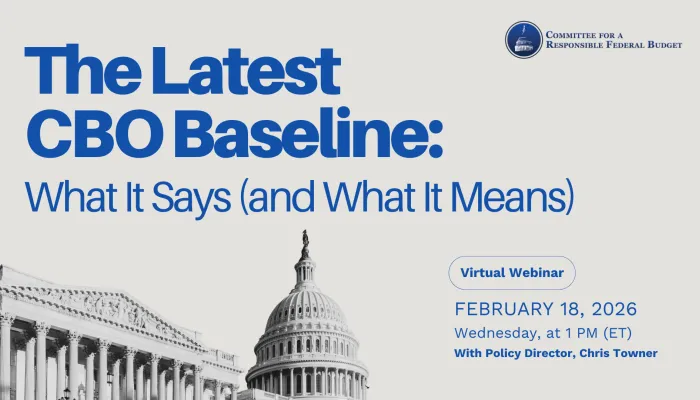Maya MacGuineas and Robert L. Bixby: Trump's "skinny budget" gets an incomplete
Maya MacGuineas, president of the Committee for a Responsible Federal Budget and head of the Campaign to Fix the Debt, and Robert L. Bixby, executive director of the Concord Coalition, wrote an op-ed that appeared in The Des Moines Register. It is reposted here.
During the 2016 presidential campaign we headed an initiative in New Hampshire and Iowa called “First Budget.” It focused on the dangers posed by our nation’s unsustainable budget policies and asked the candidates to make solving this problem a high priority in their first budget if they won the presidency.
The eventual winner, Donald Trump, has now released a limited set of proposals that give some indication of his fiscal priorities as president. As a first budget, however, it receives a grade of “incomplete.”
The so-called “skinny budget” released on March 16 focuses on congressional appropriations (“discretionary spending”), which account for just 30 percent of federal spending. Moreover, the recommended spending levels look out no further than 2018.
Missing are some major initiatives the president ran on such as tax reform and a big infrastructure investment that could profoundly affect the government’s finances. The budget plan also fails to give the full costs of building a border wall.
Also missing is an overall fiscal target — such as balancing the budget or stabilizing the debt as a share of the economy — and the administration’s “baseline” economic and spending projections covering all areas of the budget for 10 years, including the fast-growing entitlement programs and interest on the debt.
These crucial projections are needed to show where the administration thinks the budget is headed if no action is taken and how its proposals would affect that outlook.
Instead of outlining 100 percent of a plan for 10 years, the skinny budget gives us just 30 percent of a plan for one year.
All we know is that Trump proposes a $54 billion increase in base defense spending for 2018 that would be paid for with large spending reductions in domestic agencies such as the Environmental Protection Agency, the Departments of State, Agriculture, Labor, Education, and Health and Human Services, among others.
The non-military agency cuts may be aimed at reducing the federal bureaucracy but they would do nothing to reduce federal spending or cut the deficit in 2018. They would simply offset the defense increase Trump is asking for.
Moreover, the level of cuts proposed in non-defense programs would be difficult to achieve and target the least problematic portion of the budget.
Non-defense discretionary spending accounts for only 15 percent of the budget and 5 percent of projected spending growth over the next 10 years. By contrast, Social Security and Medicare, which Trump has promised not to touch, account for 50 percent of projected spending growth over this time.
Our largest fiscal problems loom beyond 2018 with the Congressional Budget Office projecting deficits to rise from $487 billion that year to $1 trillion by 2023. Over the coming decade, debt is projected to rise by more than $10 trillion and reach an alarming 89 percent of GDP.
In releasing the spending proposals, White House Budget Director Mick Mulvaney observed, "Our $20 trillion national debt is a crisis, not just for the nation, but for every citizen.”
While we appreciate that sentiment, we can’t help but note that nothing in the skinny budget would address the problem.
The administration has promised that a full budget later this spring will cover taxes and mandatory spending such as Social Security and Medicare, as well as a full fiscal path. We urge the Trump administration, when that true “first budget” is released, to include a plan to put the nation on a sustainable fiscal path. The plan should:
- Achieve declining debt levels during the next four years (as a percent of the economy) and set on a continuous downward path thereafter.
- Slow the growth of federal health care spending and improving the health care delivery system so that it is less of a drain on our economy and the budget.
- Make Social Security sustainable and secure, strengthening it for future retirees and generations.
- Reform the tax code by eliminating, reducing or reforming tax preferences in order to simplify the code, grow the economy, enhance competitiveness and reduce the deficit.
- Protect critical investments to promote economic growth and opportunity.
Finally, as the process unfolds we urge the president to work closely with members of Congress in both parties to enact a budget into law. A budget that cannot be enacted cannot address our fiscal problems.
"My Views" are works published by members of the Committee for a Responsible Federal Budget, but they do not necessarily reflect the views of all members of the Committee.


